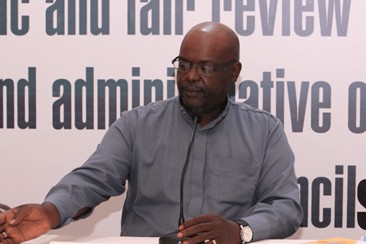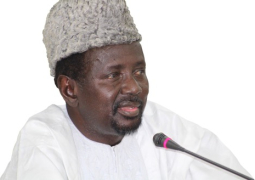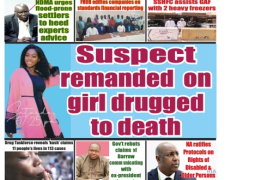
In a testimony before the Local Government Commission of Inquiry (LGCI), Batchilly accepted responsibility for multiple breaches of financial regulations and procurement procedures, revealing a pattern of poor oversight, political pressure, and disregard for established council rules.
Batchilly, who began working with the BCC in 1999 and rose through the ranks to become CEO, confirmed authorising a D400,000 impress to the Mayor without any proper justification or record in the impress ledger, in direct violation of Article 701 of the Local Government Financial Manual.
He admitted that the disbursement lacked both an emergency basis and the necessary procedural safeguards, stating: “Yes, that is true,” when asked if the allocation was unlawful. Lead Counsel Patrick Gomez reprimanded Batchilly for failing to uphold his responsibilities as CEO and for serving as a “rubber stamp” to the Mayor's decisions.
Another damning revelation involved the procurement of LED lights worth D1.29 million from Dakar without following any procurement procedure.
Despite the Gambia Public Procurement Authority (GPPA) rejecting the application due to the absence of a procurement method, signed forms, or conflict of interest declarations, the purchase proceeded. Batchilly admitted that the transaction did not go through the required processes, later conceding it was “not a wise decision.” When asked whether a quotation was received from the supplier, he said he could not recall, and he confirmed there were no procurement documents at all.
In addition, Batchilly acknowledged that over D2.3 million was spent on activities associated with REFELA (Network of Locally Elected Women of Africa) without supporting documentation.
The payments were made to non-council members, and the Mayor’s involvement in these expenditures was repeatedly questioned. When the Chairperson of the Commission, Jainaba Bah, highlighted the lack of records for these transactions, Batchilly admitted, “Our conduct was wrong.”
The inquiry also exposed the unlawful disbursement of D900,000 under the pretext of a “visibility budget” linked to the Banjul Ostend project.
The former Director of Finance, Momodou Camara, refused to sign the payment due to a lack of supporting documents. In response, he was removed from the Steering Committee and replaced with his subordinate, the finance manager, who approved the funds.
Batchilly confirmed that Camara was removed in part because he declined to sign the cheque. Letters written by Batchilly to Camara described the finance director as “illogical” and accused him of delaying the project.
Gomez pointed out that this violated financial rules, particularly since the Finance Director is legally required to be a signatory to all council accounts. Batchilly admitted that the removal was improper and the meeting held to decide it was irregular and selectively convened.
Further irregularities included over D1.1 million spent on media coverage and town hall meetings, which were not part of the project's approved budget. Batchilly initially said the funds came from an indirect cost allocation but later backtracked, claiming they were drawn from the visibility budget. Among these expenses were D30,000 paid to Kerr Fatou for live coverage, D89,000 to Sabs Multimedia for logistics, and D82,000 for 300 t-shirts, the contents of which Batchilly could not recall. “At this juncture, I am lost,” he said, when asked what was printed on the shirts.
The Commission also heard that D259,000 was spent on mobile phones in a single sourced procurement without GPPA involvement, and D232,000 was paid for accounting software that was never used.
Batchilly said the software was acquired on the advice of a previous finance manager, but it was later found incompatible with the project’s reporting requirements.
Equally troubling was the decision to issue D33,000 loans to Steering Committee and project team members, which have largely gone unrecovered.
Batchilly admitted that only one monthly deduction of D3,000 was made and the rest of the funds remain unpaid. “The decision was wrong,” he acknowledged, explaining it was made under pressure ahead of the Tobaski celebration.
Throughout the proceedings, Batchilly admitted that financial discipline within the BCC was lacking.
He confirmed that decisions were often made informally and under pressure, and that established approval thresholds were not followed.
He acknowledged that payments were made without budget backing, that procurement processes were bypassed, and that the Mayor who is not a designated procurement officer was heavily involved in financial decisions.
Asked repeatedly whether the Mayor conducted procurement, Batchilly answered “yes,” and conceded that it was “not proper.” When challenged on contradictions between his stated principles and his actions, including funding religious and community groups, he often cited pressure or discretionary decision making.
The Commission, however, emphasized that all expenditures must align with the council’s approved budget and procurement laws.
Lead Counsel Gomez also probed Batchilly’s decision to replace the Finance Director as a signatory on the Banjul-Ostend project accounts held at BSIC and Eco Bank suggesting the move was designed to circumvent financial safeguards.
Batchilly conceded that the process was irregular and that he did not fully understand the implications at the time.
“I have learnt,” he said. “I now know the provisions of the law.”
Despite this, Gomez stressed that ignorance of the law does not excuse the gravity of the violations committed.
As the inquiry continues, Batchilly has been asked to provide supporting documents, budget breakdowns, and bank statements relating to the BCC and the Banjul-Ostend project.




